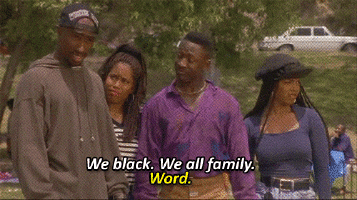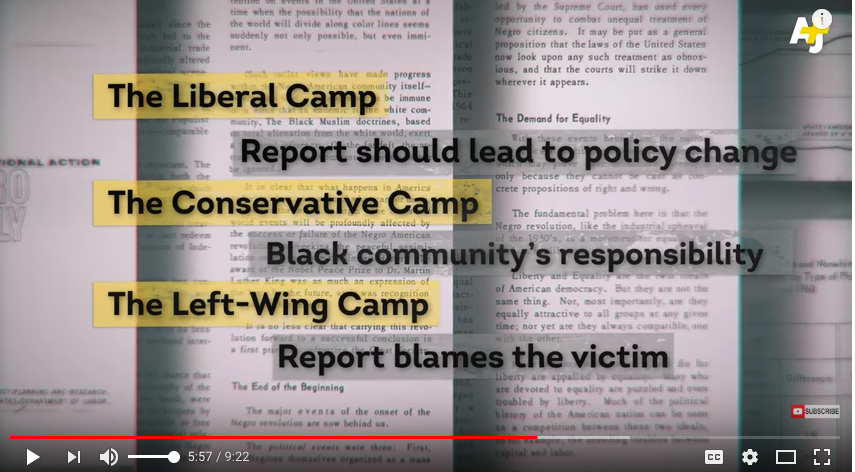I’ve decided to write a series of posts on Black families. It’s a topic that’s on the forefront of my mind, and yet hasn’t been explored on Obsidian yet. I want to dispel some myths around Black families and also highlight the issues that they have and why. So this is part 1, and a post that will be very dear to my heart. Black fatherhood. Look anywhere in mainstream American Media and you’ll see it, the absent Black father! It’s so pervasive that it’s assumed all Black children are missing their fathers. Where do they go? No one seems to know. But what they do know is that it has destroyed the Black community! It’s the cause of all of our woes as a culture and is why we will never be as successful as our white American counterparts.
Naturally it’s utter bullshit. Despite the fact that mainstream American Media is not known for being unbiased, people still believe this myth. To be honest, although I never understood why this idea did not match up with my life experiences, I too, wrote an article on Black families when I was a wee lad speaking on the damage Black absentee fathers caused. As a preteen I found this idea personal as I was one of those children with an absent father. Yet today, I’m excited to tell you that this was all a lie. The idea of the Black absentee father was caused by a lot of misunderstandings, a nice helping of racism, and of course… a little bit of a past coming to bite us in the ass.
From the 1880s until about the 1960s, marriage in the Black community was all the rage. It was simply what you did. In particular,if you were to have gotten pregnant and had not been married, you would have gotten married. To not marry would be disgraceful for both parties. . During this time, it was also incredibly hard to survive in society as a single parent. Often times, the parents would get married for financial reasons in addition to social pressures. Although this was common in the country at large, the stigma and pressure was stronger in the Black community.
When you look at 1880 through the 1960s and then compare it to now, it can become a incomplete picture. ith only that information as the basis of the Black community’s relationship with family units it is easy to forget that before the 1880s census, many Black Americans were recently enslaved. Does that matter? Yes, yes it does. It’s simple, since Black Americans were treated as property, they had had little control over who they married, or if they married at all. Which in turn means that the relationship to the family unit was determined by white slave owners. The Christian perspective that was prevalent among slave owners led to the importance of a nuclear family. At the same time, marriage between slaves was primarily used for the benefit of the slave owners, and couples that were together could be broken up at the whim of a slave owner. In addition, couples would be married if one of them became pregnant. It wasn’t uncommon for these children to then be separated from their parents and sold to another slave owner to be married and the whole process would begin again.
Interestingly enough, although we cannot track what tribes many African Americans are descendants of, many tribes did have a concept of marriage, but there was also a communal element to family. Instead of just a nuclear family being isolated to raise their children, the idea of family included the extended family if not also the whole tribe itself. This is in part most likely where the matriarchal idea was created and how it was passed on even as our tribes were mixed and separate throughout slavery. This idea of the community raising children was found within slave communities and still exists today within African American communities. The question then becomes was the nuclear family ever really part of African American heritage, or was an idea pushed upon us by white owners which sense has been rejected in many ways?

In the middle of the Civil Rights Movement, an influential report came out which is what brought this idea up begin with. The Negro Family: The Case For National Action, was written by Daniel Patrick Moynihan and released in 1965, It’s also sometimes referred to as The Moynihan Report. During the intense political climate of the sixties, Black Americans were being scrutinized to determine whether they were worthy of Rights. Moynihan claims that many of the problems that where are occurring in the Black community were because of a failing family structure. Daniel suggested the failing family structure was due in part to the legacy of slavery. The difficulty for of finding work for Black men would lead to an increase of out-of-wedlock births thereby creating single family household and more poverty. Essentially, this lays the blame of poverty the on the Black people.

This created problems that I will cover shortly. In his article and in statistics since then, there has been an increase in the number of single mothers and a decrease in marriages (in the Black community).
The problem is is that people aren’t critical when thinking about what it means to be a “single” mother. As much as Black fathers absenteeism is discussed, the statistics have nothing to do with their interactions with their children but instead focus only on the marital status of the woman. To be a “single mother” exclusively means that the mother is unwed. You could have a long-term boyfriend, your partner could have died, your partner could be in jail, or even chose to live separately and all of these things are included under this absent father statistic. Additionally, being unwed does not explicitly mean that the father is not in the picture. This means that the picture that was portrayed by the Moynihan Report could vary greatly from reality. A 2005 study showed just that.
In 2005 there was a study on families done by the CDC.This study focused on the way that fathers relate to their children. Can you guess what they found? Ironically, on average Black men were found to be the most attentive fathers of those site, across almost all metrics collected.

This is fascinating, because it is impossible to be both the most attentive fathers and absent. It becomes critical to consider then, is the ratio of unmarried mothers in the Black community even a useful statistic when discussing the health of the Black family? Especially given that the Black community focuses on raising children in a way that doesn’t necessarily require the ”traditional” nuclear family unit. I found this to be particularly interesting that despite the fact that many of the Black men in this country are in jail, and yet somehow are still the most attentive to their children.
The whole idea seems obvious to me and yet Moynhian’s 1965 Report is still frequently used as a source even though it is clearly a biased piece of work. Moynihan was trying to do good by the Black community, but what it truly demonstrates is an issue that we even have today. When people with power step in to solve problems, they often don’t actually take the time to look at or understand before proposing solutions. Oftentimes, they end up causing more problems layered on the ones that were previously there. It’s unfortunate, but it’s also a problem of white liberals in this country when they decide to take up trying to support other races. I think this is a clear example of how important it is for people looking to do ally work to be knowledgeable about the people they are advocating for via some first-hand knowledge, instead of putting their biases on things they don’t understand.
This is just one factor in the Black American family. One myth that allows people to dehumanize us, boiling us down to a race that needs saving. This was part one and the series about Black families and part two will be on mental health. We will continue to look into other issues how they created the systematic oppression that Black families are under today.
If you like this work, consider supporting it on patreon https://www.patreon.com/Obsidiantea Or buying me a cup of coffee on https://ko-fi.com/obsidiantea
https://www.huffingtonpost.com/josh-levs/no-most-Black-kids-are-no_b_11109876.html
https://www.cdc.gov/nchs/data/nhsr/nhsr071.pdf

All of the statements made are true in some areas of the Black community. One more question, why is a white woman talking about this issue, BLACK PEOPLE!!?? Nothing against this woman but we have to do better!!
I mean, I did use national stats. So these things are general trends. As a Black writer using the work of an ally with much more financial access than I have to this material, why call her out at all? We have been mislead for generations, that’s why I thought it was important to writer about. Assuming you are Black yourself, what are you doing to have these conversations? I’d love to support your work and conversations you are having within our culture. Let’s do better!